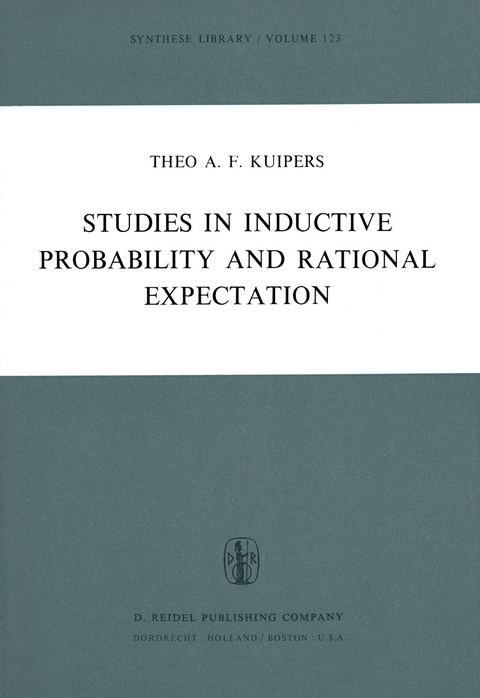
Studies in Inductive Probability and Rational Expectation
Springer (Verlag)
978-94-009-9832-2 (ISBN)
3 in philosophy, and therefore in metaphilosophy, cannot be based on rules that avoid spending time on pseudo-problems. Of course, this implies that, if one succeeds in demonstrating convincingly the pseudo-character of a problem by giving its 'solution', the time spent on it need not be seen as wasted. We conclude this section with a brief statement of the criteria for concept explication as they have been formulated in several places by Carnap, Hempel and Stegmiiller. Hempel's account ([13J, Chapter 1) is still very adequate for a detailed introduction. The process of explication starts with the identification of one or more vague and, perhaps, ambiguous concepts, the so-called explicanda. Next, one tries to disentangle the ambiguities. This, however, need not be possible at once. Ultimately the explicanda are to be replaced (not necessarily one by one) by certain counterparts, the so-called explicata, which have to conform to four requirements. They have to be as precise as possible and as simple as possible. In addition, they have to be useful in the sense that they give rise to the formulation of theories and the solution of problems. The three requirements of preciseness, simplicity and usefulness. have of course to be pursued in all concept formation.
Professor Theo Kuipers is the author of From Instrumentalism to Constructive Realism (Synthese Library 287, 2000). He is the leader of the Groningen Research Group `Cognitive Structures in Knowledge and Knowledge Development', which gained the highest possible scores in two successive assessments of Dutch philosophical research by international committees.
1. Introduction.- 1. Concept Explication.- 2. Objectives and Survey.- 2. Cognitive Rationality.- 1. On the Explication of the Concept of Rationality.- 2. Cognitive Rationality and Patterns of Expectation.- 3. Inductive Reasoning and Inductive Probability Theory.- 3. Logico-Mathematical Preliminaries.- 1. Logical Vocabulary.- 2. Set-theoretical Vocabulary.- 3. Some Elements of Probability Theory.- 4. Formally Rational Expectation in a Paradigmatic Context.- 1. Paradigmatic Contexts.- 2. Two Conditions for Rational Expectation.- 3. A Framework for a Paradigmatic Context.- 4. First Analysis of a Rational Expectation Pattern.- 5. A Framework for a Paradigmatic Context (continued).- 6. Third Formal Condition for Rational Expectation.- 7. Decidable Contexts.- 5. Generalized Carnapian Systems.- 1. Introduction.- 2. Constitutive Principles and Definition of GC-systems.- 3. General Analysis of GC-systems.- 4. Analysis of Positive Inductive GC-systems (0 < ? < oo).- 5. Analysis of Negative Inductive GC-systems (? < 0).- Appendix to Section 2 (Proof of T2).- 6. Hintikka and Universalized Carnapian Systems.- 1. Introduction.- 2. NH-systems.- 3. Hintikka-systems (H-systems).- 4. Some Fundamental Properties of H-systems.- 5. An Urn-model for H-systems.- 6. The Equivalence of NH- and SH-systems: Universalized Carnapian systems (UC-systems).- 7. Analysis of UC-systems.- 8. Fundamental Discussion Related to Applications.- 9. Finite Parameters for H-systems.- 10. Reformulation of H-systems; k ? ?.- 11. GH-systems and G UC-systems.- 12. Survey of Systems.- Appendix to Section 2 (Proof of T1 ).- 7. Rational Expectation in Multinomial Contexts.- 1. Carnap’s Intended Application.- 2. The Multinomial Context.- 3. Formally Rational Patterns for Open Multinomial Contexts.- 4. MaterialConditions of Adequacy; UC-systems as Expectation Pattern for Open Multinomial Contexts.- 5. Constitutional Distributions for Open Multinomial Contexts.- 6. The Hypergeometric Context.- 8. Some Problems and Related Topics.- 1. PER-systems.- 2. On Weakening WPERR.- 3. *UC*-systems and k ? ?.- 4. Confirmation Theory.- 5. Falsification.- 6. Rules of Acceptance in UC-systems.- 9. Concluding Remarks.- References.- Index of Names.- Index of Subjects.- Recurring Symbols.- Conditions/Principles/Axioms.- Definition of Systems.
| Reihe/Serie | Synthese Library ; 123 |
|---|---|
| Zusatzinfo | XII, 154 p. |
| Verlagsort | Dordrecht |
| Sprache | englisch |
| Maße | 152 x 229 mm |
| Themenwelt | Geisteswissenschaften ► Philosophie ► Allgemeines / Lexika |
| Geisteswissenschaften ► Philosophie ► Logik | |
| Naturwissenschaften | |
| ISBN-10 | 94-009-9832-5 / 9400998325 |
| ISBN-13 | 978-94-009-9832-2 / 9789400998322 |
| Zustand | Neuware |
| Informationen gemäß Produktsicherheitsverordnung (GPSR) | |
| Haben Sie eine Frage zum Produkt? |
aus dem Bereich


